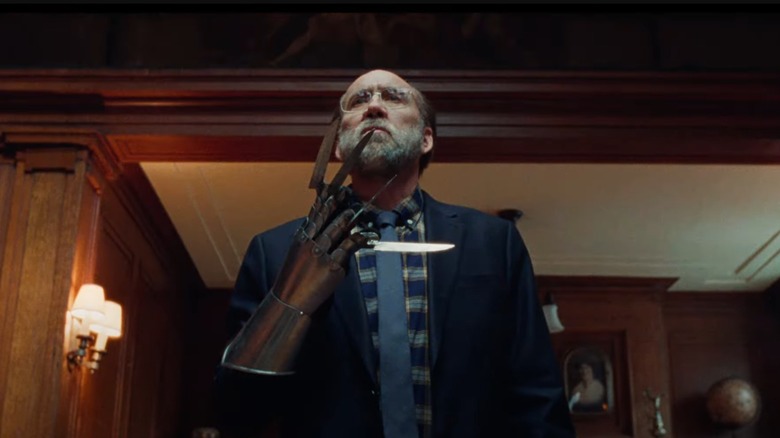Dream Scenario is Deliciously Uncomfortable
A24 released Dream Scenario starring Nicolas Cage to select theaters on November 10, with a wider theatrical release on November 22, 2023. Going into the film, I knew the concept (the same man randomly starts to appear in the dreams of millions of people across the world), but I had no clue what to expect in the execution. What drew me to the theater was pure curiosity, most of which stemmed from the unique premise, but part of me was also dying to know what Cage could do with the role of “the man of our dreams.” I’m glad it drew me in, as Dream Scenario unexpectedly became one of my favorite films of the year.
The most obvious highlight of the film is Cage’s career-cementing performance. He’s an actor who has garnered a very mixed reputation, netting an oscar win for best actor in Leaving Las Vegas (1995) while simultaneously being scrutinized for over-acting in films like The Wicker Man (2006). In this case though, there is nothing to debate — he is purely captivating. Throughout the entire film, his character never stops being interesting to observe, even in the film’s more uncomfortable moments. Dream Scenario goes all in on Cage’s ability to evoke this uncomfortability and it pays off. Whether it was as the painfully awkward family man who let his random stroke of fame go to his head, or as the indifferent and/or sinister phantom who haunts dreams and nightmares, Cage gave me countless moments that made me desperately want to look away, and yet I couldn’t. His performance had me constantly questioning whether I should be despising him or sympathizing with him. I was regularly recoiling in my seat, and at times literally face-palming. All of this was completely intentional on the film’s part, and I found it brilliant, but if you’re the type of person to be deeply affected by second-hand embarrassment, I don’t think you’d find this movie easy to watch.

A shining quality of the film that I wasn’t expecting was its commentary on viral fame, which came with the execution of its central concept. As a result of being in basically everyone’s dreams, Cage’s character, Paul, becomes famous overnight. Throughout the film we see him go from being a bumbling, but ultimately harmless man to a monster, or at least a monster in the eyes of the people. At first, this completely random stroke of fame seems like a blessing, boosting his self-confidence and putting him on a fast-track to success. Then we see the notoriety change him into someone he’s not, becoming selfish and egotistical. Finally, as the public perception of him shifts, we see that Paul is clearly unequipped to handle being a celebrity, as he effectively gets canceled because of his lack of empathy for the people having nightmares about him. Subsequently, he unravels right in front of us. At one point we even see him record and post the stereotypical apology video, complete with tears and a lack of accountability. In the age of the internet where anyone can become famous, this is all extremely pertinent. Between TikTok and YouTube, it seems like every day a regular person is suddenly being thrusted into the eyes of millions, and in this movie, we get to see every minute of it, for better and for worse.
The only part I found underwhelming was the final act. After Paul is canceled and no longer the center of attention, everything the film has to say becomes a lot less interesting. Suddenly there is a magic bracelet that allows the wearer to voluntarily enter someone’s dream. Obviously, this technology is used by influencers to advertise products to everyone in their sleep. While these so-called “dream influencers” are amusing, they don’t have much substance. The idea of getting ads in your sleep may be terrifying, but the movie says that a person’s dream can only be entered if they’re actively allowing it, and the tech is a little too outlandish to cause genuine fear, even for sci-fi. This was frustrating because the parts of the ending that do focus on Paul are enough on their own. After being out of the limelight, he is now living with the regret that was bound to follow his decisions. All we needed to see was a longing look back on his previously simple life. Granted, we do still get that, but it’s surrounded by a shoehorned dystopia that doesn’t even hold any weight.

Overall I thought the film was great. A good execution of a phenomenal concept. Even though it bit off a little more than it could chew in the ending, Cage more than makes up for it by delivering one of the best performances I’ve ever seen. It’s not a movie I had fun watching, or even one I’m itching to watch again anytime soon, but Dream Scenario is a movie I couldn’t possibly forget, even if I wanted to. As of now, the only way to catch the movie is in theaters, and while it may come to streaming eventually, I would urge anyone to fully immerse themselves in the discomfort the film evokes by seeing it on the big screen, outside the cozy comfort of your own home.

